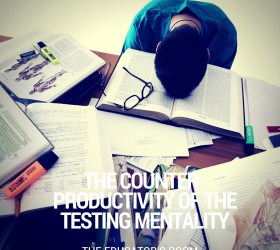The other day, I came to team planning with some really great exploration activities and math tasks for students to use to deepen their understanding of the concepts we were learning in class. As the person who writes the formal lesson plans for our department and a graduate student, I take my job seriously, and all kinds of research supports teaching students in a way that helps create meaning. In response to my activities, a fellow teacher told me that these were all great, but they wouldn’t help the students pass the test–a classic example of the testing mentality. What we needed more of, according to this teacher, was practice test questions, and, frankly, he didn’t care what initiatives were currently in place in our district. After all, he had the test results he wanted and as long as he gained a “proficient” status on his teacher evaluation, nothing else mattered. What do you do when the teachers you work with don’t give a crap about teaching beyond the test, despite the fact that these students will likely forget it all once the test has been taken? The fact is, students will value what you value. If you value the test, they will value the test. If you value learning, they will value learning. That does not make the two mutually exclusive, but you can value learning and produce results at the same time.
Combating the Testing Mentality
What happens when you only teach the test? The students only learn how to take the test. As a teacher, why wouldn’t you want this, especially if your evaluation is tied to the all-important exam at the end of the year? Do they really need to still know what you’ve taught them the next school year as long as they perform well on that final test? Not really, no. What if, instead of focusing on a glimpse of a student’s learning at one moment in time, the government focused on the retention of the learning objectives? I think teachers would focus on a deeper level of understanding if they knew that students needed to hold on to what they’ve learned for one or two years after being taught, or if a pre-test at the beginning of the next school year had to show that students really “got” it. Although this is a slightly better solution, it still contributing to a testing mentality and still puts enormous pressure on teachers to teach students to take a test rather than actually show that students are able to take what they’ve learned and apply it to meaningful real-life applications.
In some states, school districts have piloted a program where students take a combination of multiple-choice and performance-based assessments to show that they value teaching students what they really need to know. So, what do they really need to know? In math class, do they really need to memorize formulas, or do they need to know how determining the volume of a three-dimensional figure will help them be better consumers? What if students knew how to figure out how much paint they needed to cover the surface area of the walls in a room so they they didn’t have either waste money on unnecessary buckets of paint or pay someone to do it for them? What if students knew not just how to solve an equation, but how to use an equation to figure out how to budget appropriately at the grocery store? Instead of simply learning how to write an essay, what if students knew how to write an effective cover letter persuading an employer to hire them or how to create change in their community by writing a compelling letter to the editor of a newspaper? There is such great value in students learning why they need to learn that it’s a shame that so many of them miss out on this opportunity because they’ve had teachers who just want them to pass a test.
A Final Plea to Teachers Everywhere
Our students–the future of our society–deserve more than just memorizing processes and random facts. We, the generation who will need them to run the country when we get too old, deserve better than citizens who have no idea why they’re learning the concepts taught to them in science, social studies, math, and language arts. We won’t have any choice but to allow them all to vote when they get old enough, even if they have no idea how the election process works, how to research candidates, how to read a budget, or how to lobby for the rights of other citizens. The testing mentality does little more than teach students that they only need to hold on to information long enough to pass a test. If we allow it, they will all become mindless drones, doing just enough to get their jobs done and nothing more. If we take all the creativity out of our lessons, if we fail to teach them what matters or why it matters, and we continue to value a test above everything else, we are dooming ourselves to a country without leaders, innovators, or thinkers. Further, we leave behind all the students who give up because they never learned anything in the first place. Inspire your students. Teach them what matters. Help them become the citizens you want them to be.





